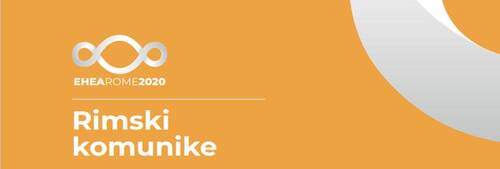The Agency for Control and Quality Assurance of Higher Education, with the support of the European project “Enhancing Knowledge of the EHEA and Global Dialogue – In Global”, finalized the official translation of the document “Rome Communiqué” with annexes, which represents an umbrella framework for defining future guidelines for action on in the area of the European Higher Education Area (EHEA), adopted at the Ministerial Conference in Rome in 2020.
Ministers responsible for the field of education through the aforementioned document emphasize that the future of the EHEA is envisioned as an area where students and academic staff can move freely, learn, teach, and conduct research while respecting the basic values of higher education, as well as democracy and the rule of law. In this regard, the “Rome Communiqué” also adopted the definition of academic freedom, defining it as the freedom of academic staff and students to engage in research, teaching, learning, and communication within the academic community and society, without influence and fear of reprisals (Annex I).
Higher education is recognized as a key actor in meeting the United Nations’ Sustainable Development Goals (SDGs) until 2030, so it is essential to support higher education institutions in improving their capacities to ensure that our higher education systems contribute to the achievement of the Sustainable Development Goals (SDGs).
In particular, it was highlighted that quality higher education continues to play a central role within the EHEA.
Through the aforementioned document, the ministers committed to fulfilling the defined vision by 2030 and building an inclusive, innovative, and interconnected EHEA, as a foundation for fostering a sustainable, cohesive, and peaceful Europe.
An inclusive EHEA refers to the social dimension of higher education and implies opportunities for the equal inclusion of individuals from all social groups. Although our societies increasingly rely on innovative technologies, including artificial intelligence, it is the responsibility of national systems to ensure that innovative technologies respect ethical standards and human rights, while strengthening inclusion. With this aim, the ministers adopted the document “Principles and Guidelines for Strengthening the Social Dimension of Higher Education in the EHEA” (Annex II).
An innovative EHEA is aimed at investing in the development of digital skills and competencies for all, in order to support higher education institutions in intensifying their search for solutions to the challenges facing societies. A rapid update of knowledge, skills, and competencies will be required to meet the challenges and to develop the opportunities that the new decade will bring. Therefore, it is important for higher education institutions to diversify their learning offer, but also to innovate the contents and methods of delivery. In addition to accredited study programs, it is important that higher education institutions improve their offer through special training programs for lifelong learning needs, including micro-credentials, which will enable students to develop or improve their cultural and professional skills and competencies at different stages of their lives. With this aim, the ministers adopted the document “Recommendations to National Authorities for the Enhancement of Higher Education Learning and Teaching in the EHEA” (Annex III).
An interconnected EHEA is aimed at the target that at least 20% of students who graduate within the EHEA should spend part of their studies or training abroad. Through direct contacts and synergy between different higher education systems, excellence and relevance are contributed. Therefore, we will continue to rely on the continuous support of the Erasmus program, as well as other capacity-building and cooperation programs that contribute to the fulfillment of EHEA obligations. A better connected and sustainable higher education community that strengthens inclusion, communication, collaboration, and solidarity is essential to achieving excellence within the EHEA.
The “Rome Communiqué” also emphasized the importance of the implementation of three “Key Obligations”, necessary for the functioning of the EHEA: 1. Qualification Framework and ECTS, 2. Lisbon Convention on recognition and diploma supplement, as well as 3. Quality assurance in accordance with Standards and Guidelines for Quality Assurance in the European Higher Education Area (ESG).
In cooperation with the Ministry, during June 2023, the Agency participated in the preparation of the new Implementation Report of the Bologna Process, and through the working meetings of the Bologna Follow-Up Group (BFUG) and related groups, it is expected that it will be adopted in the coming months and presented at the Ministerial Conference scheduled for May 2024 in Tirana.
At the Ministerial Conference in Tirana in 2024, will be analyzed the implementation progress in the Bologna process, and at the same time it will be an opportunity to adopt a new “communique”.

